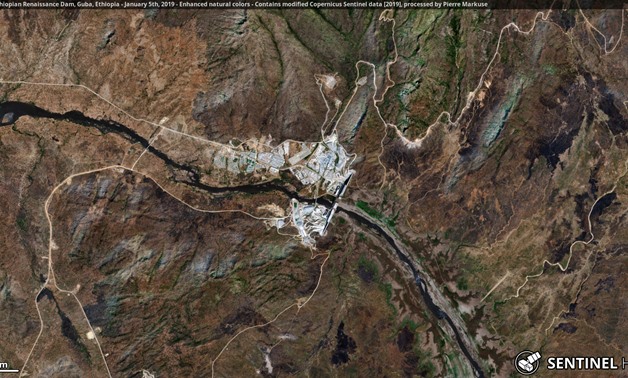
Grand Ethiopian Renaissance Dam, Guba, Ethiopia- CC via Flickr/Pierre Markuse
CAIRO - 22 May 2020: Few days after UN chief António Guterres called upon Egypt, Sudan, and Ethiopia to reach an amicable agreement on the technical different points regarding the under-construction Grand Ethiopian Renaissance Dam (GERD), Egypt announced that it is ready to resume the stalled negotiations.
“The Arab Republic of Egypt expressed its constant readiness to engage in the negotiation process and to participate in the meeting to be held, stressing the need for it to be serious and constructive and that it contributes to reaching a just, balanced and comprehensive agreement that preserves Egypt's water interests and equally takes into account the interests of both Ethiopia and Sudan,” Egypt’s Foreign Ministry announced in a statement on Friday.
Egypt’s agreement of resuming the talks came after a virtual meeting held on Thursday between Sudanese Prime Minister Abdullah Hamdouk and Ethiopian Prime Minister Abiy Ahmed. During the meeting, it has been agreed that the three parties would “complete the remaining simple part of the agreement on the filling and operation of the Grand Ethiopian Renaissance Dam as took place during the negotiation tracks over recent months.”
Ethiopian Prime Minister Abiy Ahmed stated on Thursday that he and Hamdouk “have agreed to continue with technical level engagements through our Water Ministers tasked to discuss outstanding issues and arrive at win-win solutions. I also reiterated the economic advantages of the GERD for all that we can seize through the spirit of collaboration.”
The new round of negotiations has been announced less than two months ahead of filling the dam reservoir with the Nile water due to start in July, as it has been announced by the Ethiopian side in February 2020 despite the rejection from Egypt and Sudan.
In March, Sudanese Prime Minister announced that he would resume the tripartite negotiations that have been stopped since late February after a series of four meetings between the three countries and the U.S. and World Bank’s brokerage in Washington in January and February 2020.
Recently, Egypt announced on May 6, 2020 that it has sent a letter to the members of the United Nations Security Council on the latest development of the controversial dam, according to a statement from the Egyptian Ministry of Foreign Affairs.
The difference between Egypt, Sudan, and Ethiopia dates back to May 2011 when Ethiopia started building the dam; Egypt voiced concern over its water share [55.5 billion cubic meters]. Three years later, a series of tripartite talks between the two countries along with Sudan began to reach an agreement while Ethiopia continued the dam construction.
In 2015, the three countries signed the Declaration of Principles, per which the downstream countries [Egypt and Sudan] should not be negatively affected by the construction of the dam. Since then, the talks have been resumed, but In October 2019 blamed Addis Ababa for hindering a final agreement concerning a technical problem, calling for activating the Article No. 10 of the Declaration of Principles, which stipulates that if the three countries could not find a solution to these differences, they have to ask for mediation.
The current points of disagreement concerning a plan for filling Dam in stages, a mechanism for dealing with droughts, prolonged droughts, and years of water scarcity during the process of filling the dam, and a mechanism for dealing with droughts, prolonged droughts, and years of water scarcity during the dam operation, according to a US-drafted deal that was unilaterally signed by Egypt in Washington in January 2020.

Comments
Leave a Comment